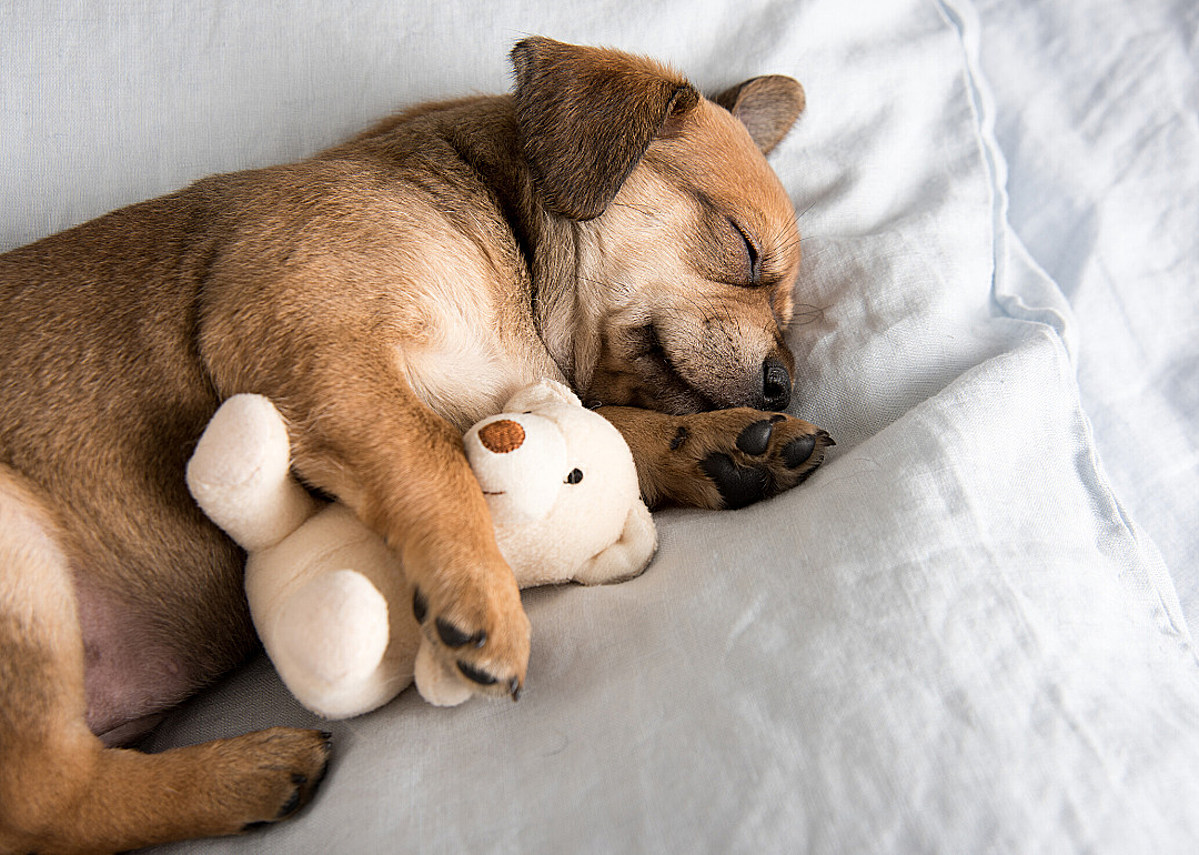
The inquiry into “How Long Can Puppies Sleep” delves into the essential understanding of the optimal sleep duration for our adorable canine companions. This keyword explores the intricate factors influencing the sleep patterns of puppies, including their age, breed, and overall health. Unraveling the mystery behind the ideal sleep duration offers insights into creating a comfortable sleeping environment, establishing effective sleep routines, and addressing potential sleep-related issues.
This exploration not only aids in promoting the well-being of puppies but also fosters a stronger bond between pet owners and their furry friends. Discovering the nuances of puppy sleep cycles, debunking common myths, and gaining practical tips for a restful night’s sleep are pivotal aspects encapsulated by the keyword “How Long Can Puppies Sleep.”
Factors Influencing Puppy Sleep

The duration and quality of puppy sleep are intricately tied to several factors that influence their overall well-being. Understanding these elements is essential for responsible pet care. Firstly, the age of a puppy plays a pivotal role; younger pups require more sleep to support their rapid growth and development.
Additionally, the breed of the puppy contributes to distinct energy levels and, consequently, unique sleep patterns. Health conditions can also impact a puppy’s sleep, with vigilant monitoring needed to ensure their comfort. Recognizing how age, breed, and health intersect in shaping a puppy’s sleep routine empowers owners to create optimal conditions for rest and contributes to a happy and healthy furry companion.
Age
The age of a puppy significantly affects its sleep requirements. Younger puppies, like human infants, need more sleep to support their rapid growth and development.
Breed
Different dog breeds have varied energy levels and, consequently, distinct sleep patterns. Understanding your puppy’s breed can help you tailor its sleep routine accordingly.
Health Conditions
Health issues can impact a puppy’s sleep. It’s essential to monitor for signs of discomfort or illness that may be affecting your furry friend’s rest.
Ideal Sleep Duration for Puppies
Determining the optimal sleep duration for puppies is crucial for their overall well-being. Understanding the ideal amount of rest involves considering factors like age, breed, and health conditions. Puppies, akin to human infants, require varying amounts of sleep as they grow.
By adhering to general guidelines and recognizing age-related variations, pet owners can ensure their furry companions enjoy a comfortable and adequate sleep routine. This careful attention to their sleep needs promotes healthy development and contributes to a happy, energetic puppy.
General Guidelines
While sleep needs vary, there are general guidelines based on a puppy’s age. Newborns may sleep up to 20 hours a day, gradually decreasing as they grow.
Variations Based on Age
As puppies transition to adolescence, their sleep patterns evolve. Knowing these changes aids in providing an appropriate sleep environment.
Creating a Comfortable Sleeping Environment
Ensuring a cozy sleeping environment for your puppy is pivotal for their well-being. This involves carefully selecting an appropriate bed that suits their size and breed, providing a comfortable and secure space for rest. Additionally, maintaining optimal room temperature and managing lighting to mimic natural day-night cycles contributes to creating a soothing atmosphere. A well-thought-out sleeping environment promotes uninterrupted sleep, supporting your puppy’s physical and mental health as they grow and develop.
Choosing the Right Bed
Investing in a comfortable bed suited to your puppy’s size and breed ensures they have a cozy space for uninterrupted sleep.
Temperature and Lighting
Maintaining an optimal sleeping environment includes adjusting room temperature and managing lighting to mimic natural day-night cycles.
Establishing a Sleep Routine
Consistency is Key
Establishing a consistent sleep routine helps regulate your puppy’s internal clock, promoting better sleep habits.
Incorporating Naps
Short naps throughout the day contribute to meeting a puppy’s sleep requirements. Balancing play and rest is essential for their well-being.
Signs of Sleep-related Issues
Identifying Sleep Disorders
Watch for signs of sleep disorders, such as excessive snoring or restlessness, and consult with a veterinarian if concerns arise.
Seeking Veterinary Advice
If your puppy’s sleep patterns drastically change or if you observe signs of discomfort, seeking professional advice is crucial for early intervention.
Tips for a Restful Sleep
Physical Activity
Regular exercise not only keeps your puppy healthy but also contributes to a more restful sleep.
Mental Stimulation
Engaging your puppy’s mind through interactive toys and activities can tire them out mentally, aiding in a peaceful night’s sleep.
Transitioning Sleep Patterns
“Evolution of Sleep Routines” explores the dynamic shifts in sleep patterns that puppies undergo as they transition from infancy to adulthood. This keyword delves into the developmental stages, highlighting how a puppy’s sleep needs change over time.
From extended periods of slumber in the early weeks to adjusting to adult sleep cycles, understanding the nuances of transitioning sleep patterns is vital for pet owners. This term encapsulates the transformative journey, offering insights into creating optimal sleep environments and addressing behavioral changes associated with a pup’s maturing sleep habits.
From Puppyhood to Adulthood
The phrase “From Puppyhood to Adulthood” encapsulates the transformative journey of a canine companion as it progresses through various life stages. It signifies the transition from the playful and explorative nature of puppyhood to the maturity and stability of adulthood. This keyword encompasses the physical, behavioral, and developmental changes dogs undergo, highlighting the evolving needs and characteristics during different phases of their lives.
Understanding and addressing the distinct requirements of puppies versus adult dogs is crucial for responsible pet care, fostering a harmonious relationship between pet owners and their furry friends throughout the diverse stages of life.
Puppies Need Less Sleep Than Adult Dogs
Contrary to popular belief, puppies generally require more sleep than adult dogs due to their rapid growth and development.
Disturbing a Sleeping Puppy is Harmful
Waking up a peacefully sleeping puppy might seem harmless, but it can have adverse effects on their well-being. Disturbing a sleeping puppy disrupts their natural sleep cycles, hindering essential rest for growth and development. Puppies, like humans, need uninterrupted sleep to maintain optimal health.
Constant disturbances may lead to heightened stress levels, affecting their overall temperament and behavior. It’s crucial to recognize the importance of allowing puppies to complete their sleep cycles undisturbed, fostering a positive environment for their physical and mental development.
REM and Non-REM Sleep
REM (Rapid Eye Movement) and Non-REM (Non-Rapid Eye Movement) sleep are two distinct phases in the sleep cycle, each playing a crucial role in the overall sleep quality. During REM sleep, the eyes move rapidly in various directions, and vivid dreaming commonly occurs.
This stage is essential for cognitive function and emotional well-being. Non-REM sleep consists of multiple stages, including light sleep and deep sleep, facilitating physical restoration and growth. Understanding these sleep phases is vital for comprehending the complexities of a dog’s rest patterns and ensuring their overall health and well-being.
Importance of Monitoring Sleep Patterns
The significance of vigilantly observing sleep patterns cannot be overstated. Monitoring a pet’s sleep habits is crucial for discerning potential health issues and ensuring their overall well-being. By keenly observing the duration, quality, and any deviations in sleep patterns, pet owners can detect early signs of discomfort or underlying medical conditions.
This proactive approach not only aids in swift intervention but also fosters a strong bond between owners and their furry companions. In essence, the importance of monitoring sleep patterns lies in promoting a pet’s health, addressing concerns promptly, and nurturing a harmonious human-animal relationship.
Detecting Health Issues
Identifying potential health concerns is crucial for maintaining your pet’s well-being. Recognizing signs of discomfort, changes in behavior, or unusual symptoms can help you detect health issues early on. Regular observation and prompt veterinary attention ensure your furry friend receives the necessary care, promoting a healthier and happier life.
Adjusting Lifestyle Accordingly
Adapting one’s lifestyle to align with specific needs or changes is the essence of “Adjusting Lifestyle Accordingly.” This concept involves making conscious modifications to daily routines, habits, and choices in response to evolving circumstances. Whether accommodating a new pet, embracing healthier habits, or addressing unique requirements, the ability to adjust one’s lifestyle accordingly showcases flexibility and a proactive approach to ensuring well-being and harmony in various aspects of life.
Human-Canine Sleep Relationship
The Human-Canine Sleep Relationship explores the dynamic connection between humans and their canine companions during sleep. This intricate bond involves sharing sleep spaces, fostering a sense of security for both parties. Understanding and nurturing this relationship contributes to the overall well-being of both humans and dogs, enhancing the companionship and trust shared between them.
Bonding Through Sleep
“Establishing a strong emotional connection with your furry friend goes beyond daytime activities. ‘Bonding Through Sleep’ encapsulates the intimate moments of sharing sleep spaces, fostering trust, and building a profound connection. The tranquility of these shared moments contributes to a deeper understanding. It strengthens the unique bond between pet owners and their beloved companions, creating a sense of security and affection that transcends wakefulness.”
Training Techniques for Better Sleep
Enhance your pup’s slumber with effective training techniques designed for optimal sleep. Discover positive reinforcement methods that foster positive associations with bedtime, ensuring a restful night for your furry companion. Patience and consistency are key elements in cultivating a solid sleep routine promoting better sleep patterns. Explore these techniques to create a comfortable and soothing environment for your puppy’s well-deserved rest.
Positive Reinforcement
Positive reinforcement is a training technique that focuses on encouraging desired behaviors by rewarding them with positive stimuli. It involves the timely and deliberate presentation of rewards, such as treats, praise, or affection, to reinforce actions that contribute to learning or behavioral development. This approach aims to create a positive association, motivating individuals, including pets, to repeat the desired behavior. By accentuating positive actions, positive reinforcement fosters a supportive and constructive environment for effective learning and behavior modification.
Traveling with a Sleeping Puppy
Embarking on journeys with your slumbering puppy can be a delightful adventure, but ensuring their peaceful rest during travel is paramount. Navigating new environments can be challenging for your furry friend, making it essential to consider portable sleep solutions. Bringing familiar items, such as their cozy bed or favorite blanket, can create a sense of comfort amidst the unfamiliar. By incorporating thoughtful strategies and providing a familiar sleep setup, you can help your sleeping puppy adapt seamlessly to different places, ensuring both their well-being and your travel experiences remain enjoyable.
Conclusion
Puppies, like newborns, require lots and lots of sleep, so keep that in mind. Every 24 hours, your puppy will require roughly 18–19 hours of sleep. As a result, just plan on staying awake for four to five hours at a time. You can be in for a rough period together if they’re keeping you up at night and playing.
FAQ
Can I let my puppy sleep in my bed?
While some owners prefer co-sleeping, it’s crucial to set boundaries and ensure both you and your puppy get quality rest.
How much sleep does a newborn puppy need?
Newborn puppies may sleep up to 20 hours a day, gradually decreasing as they grow.
What signs indicate a sleep disorder in puppies?
A: Signs may include excessive snoring, restlessness, or unusual movements during sleep. Consult with a veterinarian if concerns arise.
Can I wake up my sleeping puppy?
Gently waking your puppy occasionally helps them adapt to various situations and environments, but ensure most sleep is undisturbed.
How can I help my puppy sleep better during travel?
Bring familiar sleep items and consider portable sleep solutions to help your puppy adjust to new environments.








